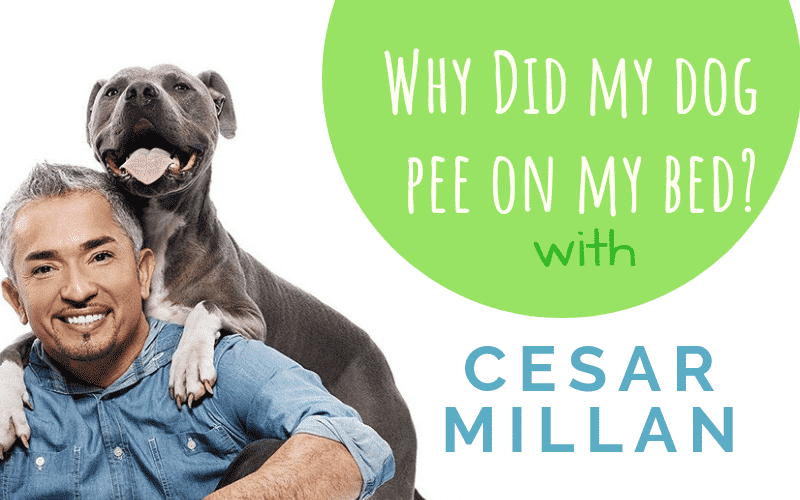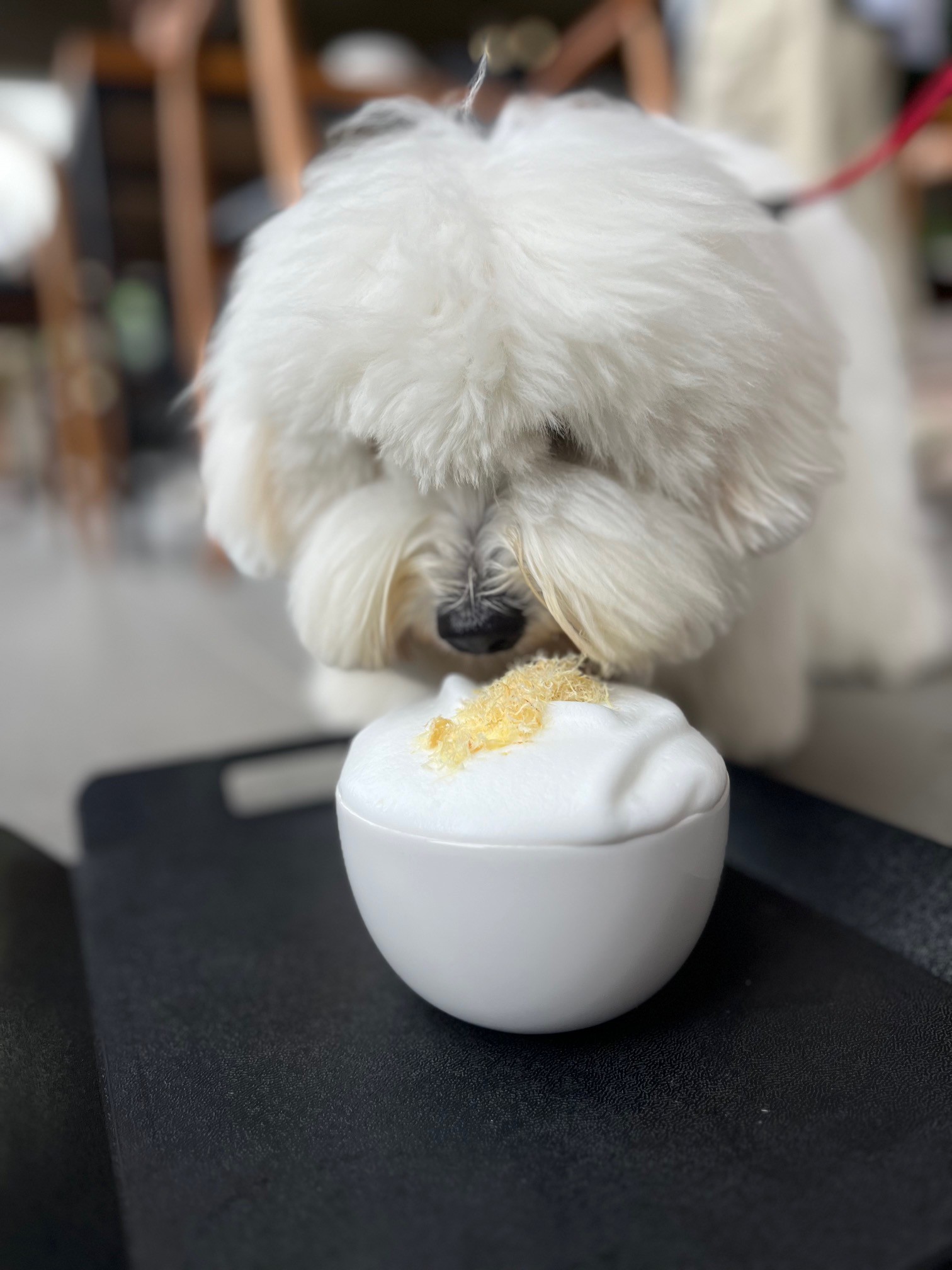With Cesar Millan
Imagine that it’s Sunday night, and you fall asleep in bed next to your pup after watching your favourite TV show. When your alarm goes off for work in the early hours of the morning, you roll over to find not your cuddly pooch, but a warm, wet spot and a sprawling yellow stain on your sheets.
Yuck! What a way to start your Monday, huh?
Been there, done that? Most dog owners have, including yourself, most likely — after all, that’s why you’re reading this article, right? You’re trying to figure out why your dog peed in your bed and what it means.
Before you punish your dog or pull out the treats to try and train them, take a page out of Cesar Millan’s book. (Literally — Cesar’s Rules: Your Way to Train a Well-Behaved Dog is a godsend for dog owners.)
You might recognise Cesar Millan from his hit TV series, The Dog Whisperer. Here’s what the king of canine behaviour can teach us about why our dogs pee on our beds and what it might mean.
My dog peed on my bed — what does this mean?
That question isn’t as easy to answer as you may think. There are many reasons why a dog may pee on your bed.
Dogs’ elimination behaviours are much more nuanced than they appear. After all, dogs aren’t performance animals; they’re incredibly intelligent beings with complex personalities and behaviours.
And when they do something we don’t like, or when they disobey us, we often forget just how intelligent and individual they are.
It’s impossible for us to know what’s going on in our dogs’ brains, but with a little time and patience — and with the guidance of Cesar Millan — we can solve the problem and learn how to understand our dogs’ thoughts, emotions, and behaviours.
Understanding canine behaviour and urination habits
While trying to figure out why your dog peed on your bed and what it might mean, you might automatically assume your dog is intentionally misbehaving.
After all, we humans tend to be a bit impatient when it comes to housebreaking our dogs.
We don’t want our dogs to make messes in our homes, so we try to train them out of it as quickly as we can. Not only can we be impatient when it comes to training our dogs to avoid certain behaviours, but we can also be impatient when it comes to their overall temperament.
Here’s an example — let’s say you’re planning to add a new furry family member to your pack.
You go to the adoption agency or animal shelter and you see two dogs. One is jumping up and down, running circles around their enclosure, knocking over their water bowl and getting tangled in their leash. The other dog is lying down, calm and patient, just waiting for you to pet them.
Which one are most people more likely to pick? That’s right — the submissive one.
Why? Because dogs who are naturally submissive require less time and effort when it comes to training, especially house-training. And let’s be honest — most of us need all the extra time and effort we can get.
Our impatience may only worsen the problem, according to Cesar Millan, who claims house-training our dogs is a “human” need.
Your dog’s need is to go and relieve herself! So if you want to break your dog of this habit, you need to be sure you are being honest and taking responsibility by providing exercise and discipline according to your dog’s needs.
Cesar Millan
Why does my house-trained dog pee in the bed?
Did you know that house-training often has nothing to do with why your dog peed on your bed?
Sure, it can play a role in some cases, particularly if you have a puppy or a rescue dog that’s never been trained. But there are many reasons why dogs pee on their owners’ beds — sometimes, even fully housebroken dogs have accidents!
Submissive urination is one of the key reasons why house-trained dogs might soil the bed.
To fully understand submissive urination, it’s important to remember that different dogs have different personalities and temperaments.
Some furry friends are feisty and assertive, while others are fearful and shy. That behaviour plays a much larger role in your dog’s bathroom habits than you might think!
What is submissive urination?
Dogs who are submissive by nature are actually more likely to suffer from submissive urination.
This means that they eliminate waste when overstimulated.
This is an instinctive reaction to an intense behavioural conflict happening inside the dog’s brain — and it’s one that the dog shouldn’t be punished for.
Many articles on this subject claim that dogs exhibit submissive urination when overly excited or scared, but this is not always the case.
“Overstimulated” is a much better, and more accurate, term than “overexcited.”
Remember, like us, dogs can experience a wide range of emotions — tying their behaviour to one single emotion won’t help solve the problem.
In fact, this may only make the issue worse.
When a dog is overstimulated and urinates, it may be the result of conflicting emotions, rather than one single, overwhelming emotion.
Dogs who are submissive may get excited at external stimuli, like meeting a new person or hearing a loud, startling sound.
Their submissive nature makes them want to stay calm, but their temporary excitement or fear clashes with their usual temperament.
These conflicting behavioural motivations may result in spontaneous urination.
And, unsurprisingly, submissive dogs are more likely to urinate when their bladders are full — so it’s important that your dog have a regular bathroom break schedule.
But submissive urination isn’t just associated with behaviour — it often manifests in older dogs as well.
It’s important to note that age-related submissive urination shouldn’t be confused with incontinence.
If your well-trained dog is getting older and has started peeing on your bed or in your house, you should seek veterinary advice immediately to ensure it’s not a medical issue first.
Other reasons your dog might pee on your bed
If your dog isn’t exactly the submissive type, they might also pee on the bed because…
- They’re marking their territory — this is more common in younger dogs.
- They have a medical condition, such as UTI, kidney disease, or arthritis.
- There’s a problem with the urethral sphincter, the muscle which controls urination.
If you suspect your dog’s spontaneous urination problem is related to their health rather than their behaviour, you should seek veterinary attention immediately.
Solving the urination problem: tips from The Dog Whisperer
If you want to break your dog out of the submissive urination habit, you need to first identify the source of the problem before you can tackle it — and that includes examining your own approach to training.
Millan says in his book Cesar’s Rules: Your Way to Train a Well-Behaved Dog;
Dog training is something that was invented by humans, but dog psychology was invented by Mother Nature. Before we even think about rules to train our dogs, we need to think about rules to train ourselves.
Cesar Millan, The Dog Whisperer
Throughout his book, Millan talks about two important human and canine behaviours:
- Calm-assertive
- Calm-submissive
Humans must be calm-assertive toward their dogs if they want their dogs to exhibit what he calls the calm-submissive state.
Dogs are masters at sensing even the slightest change in mood and behaviour. They can sense — and even smell — when you’re fearful or frustrated.
That’s why it’s imperative, says Millan, to be mindful of how you’re feeling and how your own actions and emotions might influence your dog’s emotional state.
Being calm-assertive doesn’t mean being aggressive, mean, or dominating. Rather, dog owners must be confident, but also calm and relaxed.
They must know what they want to achieve, and they must be clear and direct in the messages they send to their dogs.
Good dog owners (and effective dog trainers) never try to intimidate or control their dogs entirely.
Bearing that in mind, here are some tips for training your dog to stop peeing in your bed (or in the house, or in their crate).
Tip #1: Pay attention to stimuli that may cause the urination.
What makes your dog urinate?
Do they do so in fear, or when meeting new people?
Then, once you’ve made a note of those stimuli, try to avoid them, or introduce your dog to them gradually.
For example, if your dog gets excited when meeting new people, let your friends know in advance not to touch, talk, or look at your dog at first.
Part of this involves paying attention to yourself. We hate to break it to you, but in some cases, your own behaviour might cause submissive urination.
Pay attention to your dog’s emotional state and be sure to react accordingly, and also avoid situations that may overstimulate your dog where possible.
ip #2: Clean up your dog’s messes behind their back.
If your dog pees in your bed, put them outside or in another room before changing the sheets.
If you immediately clean up the mess, you’re signalling to your dog that it doesn’t matter if they continue the behaviour — you’ll always be there to clean it up.
This is where the “assertive” part of the calm-assertive attitude comes in.
You want that mess cleaned up as soon as possible, but doing so sends the wrong message to your dog, so just be patient and clean up out of your dog’s sight.
Tip #3: Stay calm…
“The fact is that no animal ever responds positively to angry, frustrated, or fearful energy,” says Millan.
If your dog does pee in your bed to intentionally misbehave, staying calm shows them this behaviour doesn’t affect you, which can go a long way in breaking the habit.
Tip #4: …but also stay assertive.
But if those emotions cause them to act in a way that we don’t want, we can’t give in every time and expect the dog to change. Be firm!
Tip #5: Try using a crate.
Make sure your dog is in the calm-submissive state before approaching the crate, and also ensure you’re in the calm-assertive state.
Wrapping Up
You don’t have to be a celebrity dog trainer or veterinary neurosurgeon to rewire your dog’s brain and correct undesirable behaviours.
The key components of successful dog training, according to Millan, are respect and trust. In order to build respect and trust and strengthen your bond with your dog, you must pay attention — both to your dog’s behaviours and emotional states as well as your own.
Why does your dog pee on your bed? What do you think it means?
Tell us your story in the comments. We reply to every comment!
Hugs!
Gina & Maisy



Leave a Reply